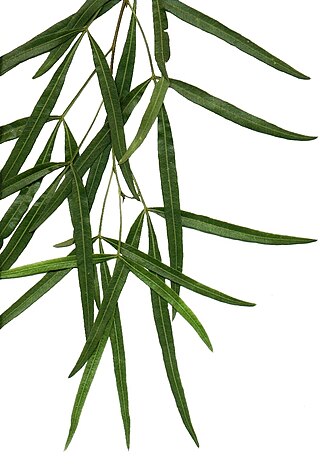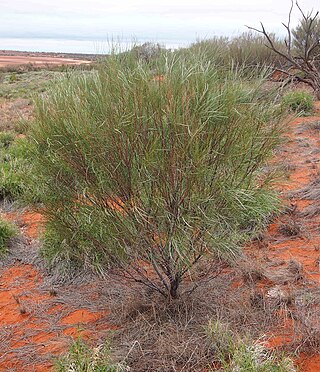
Grevillea, commonly known as spider flowers, is a genus of about 360 species of evergreen flowering plants in the family Proteaceae. Plants in the genus Grevillea are shrubs, rarely trees, with the leaves arranged alternately along the branches, the flowers zygomorphic, arranged in racemes at the ends of branchlets, and the fruit a follicle that splits down one side only, releasing one or two seeds.

Diervilla, or bush honeysuckle, is a genus of three species of deciduous shrubs in the family Caprifoliaceae, all indigenous to eastern North America. The genus is named after a French surgeon Dr. Marin Diereville, who introduced the plant to Europe around 1700.

Senna obtusifolia, known by common names including Chinese senna, American sicklepod and sicklepod, is a plant in the genus Senna, sometimes separated in the monotypic genus Diallobus. It grows wild in North, Central, and South America, Asia, Africa, and Oceania, and is considered a particularly problematic weed in many places. It has a long-standing history of confusion with Senna tora and that taxon in many sources actually refers to the present species.

Olea capensis, the black ironwood, is an African tree species in the olive family Oleaceae. It is widespread in sub-Saharan Africa: from the east in Somalia, Ethiopia and Sudan, south to the tip of South Africa, and west to Cameroon, Sierra Leone and the islands of the Gulf of Guinea, as well as Madagascar and the Comoros. It occurs in bush, littoral scrub and evergreen forest.

Searsia lancea commonly known as karee, is an evergreen, frost hardy, drought resistant tree, which can reach up to 8 metres in height with a 5-metre spread. It is one of the most common trees on the Highveld and in the Bushveld in South Africa, but not found in the Lowveld. In North America, where it is naturalised, it is known as African sumac and willow rhus.

Lonicera caerulea, also known by its common names blue honeysuckle, sweetberry honeysuckle, fly honeysuckle, blue-berried honeysuckle, or the honeyberry, is a non-climbing honeysuckle native throughout the cool temperate Northern Hemisphere regions of North America, Europe, and Asia.

Adenium obesum, more commonly known as a desert rose, is a poisonous species of flowering plant belonging to the tribe Nerieae of the subfamily Apocynoideae of the dogbane family, Apocynaceae. It is native to the Sahel regions south of the Sahara, tropical and subtropical eastern and southern Africa, as well as the Arabian Peninsula. Other names for the flower include Sabi star, kudu, mock azalea, and impala lily. Adenium obesum is a popular houseplant and bonsai in temperate regions.

Tecomaria capensis, the Cape honeysuckle, is a species of flowering plant in the family Bignoniaceae, native to southern Africa. Despite its common name, it is not closely related to the true honeysuckle.

Metrosideros bartlettii, commonly known as the Bartlett's rātā, is a tree endemic to only a few parts of the Northland Region in New Zealand's North Island. It is one of twelve Metrosideros species in the family Myrtaceae. The Bartlett's rātā was first discovered in 1975 by New Zealand botanist and schoolteacher, John Bartlett. There are three known patches of dense native forest near Piwhane / Spirits Bay that contain Bartlett's rātā: Radar Bush, Kohuronaki Bush, and Unuwhao Bush. Bartlett's rātā has a high chance of becoming extinct unless immediate conservation measures are taken, due to its ongoing decline. As of 2018, only 13 adult trees are known to exist in the wild. Bartlett's rātā is common in cultivation, with it being found in several private and botanic gardens throughout New Zealand. Its current conservation status was assessed by the IUCN Red List in 2013 as "Critically Endangered" and its population trend was assessed as "Decreasing".

Myoporum insulare, commonly known as common boobialla, native juniper, is a species of flowering plant in the figwort family Scrophulariaceae and is endemic to coastal areas of Australia. It is a shrub or small tree which grows on dunes and coastal cliffs, is very salt tolerant and widely used in horticulture.

Ochna serrulata is an ornamental garden plant in the family Ochnaceae which is indigenous to South Africa. It is planted in southern African gardens and is an invasive species in Australia and New Zealand.

Croton sylvaticus is a tree in the family Euphorbiaceae. It is commonly known as the forest fever-berry. These trees are distributed in forests from the east coast of South Africa to Tropical Africa. It grows 7–13 metres (23–43 ft) in height, occasionally up to 30 metres (100 ft), in moist forests, thickets and forest edges at altitudes of 350–1,800 metres (1,100–5,900 ft).

Grevillea juncifolia, commonly known as honeysuckle grevillea, honey grevillea, honeysuckle spider flower, and many indigenous names, is a species of flowering plant in the family Proteaceae and is endemic to inland Australia. It is a bushy shrub or small tree with erect, linear leaves and clusters of bright yellow to orange flowers.

Quercus pyrenaica, also known as Pyrenean oak, or Spanish oak is a tree native to southwestern Europe and northwestern North Africa. Despite its common name, it is rarely found in the Pyrenees Mountains and is more abundant in northern Portugal and north and northwestern Spain.
Zanha golungensis, commonly known as the smooth-fruited zanha, is a species of plant in the family Sapindaceae that is native to Africa. It is used locally for timber and herbal medicine.

Acokanthera oblongifolia is a plant in the family Apocynaceae. It grows as an evergreen shrub or small tree up to 6 metres (20 ft) tall. Its fragrant flowers feature a white tinged pink corolla. The berries are purple when ripe. Its habitat is dry forest and coastal thickets. Acokanthera oblongifolia is used in local African medicinal treatments for snakebites, itches and internal worms. The plant has been used as arrow poison. The species is native to Mozambique and South Africa.

Tabernaemontana pandacaqui, known as windmill bush and banana bush, is a species of plant in the dogbane family Apocynaceae.

Diplorhynchus is a monotypic genus of plant in the family Apocynaceae native to tropical and southern Africa. As of August 2020, Plants of the World Online recognises the single species Diplorhynchus condylocarpon.

Markhamia obtusifolia is a species of plant in the family Bignoniaceae. It is found in Southern Africa.

Drypetes gerrardii is a species of small tree or large shrub in the family Putranjivaceae. Common names include forest ironplum, bastard white ironwood, and forest ironwood. It is native to tropical and subtropical central and eastern Africa. It was first described in 1920 by the English botanist John Hutchinson, who named it after the English botanist William Tyrer Gerrard who collected plants and seeds in southern Africa in the 1860s.





















